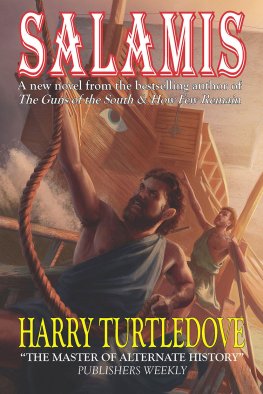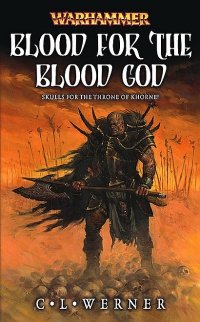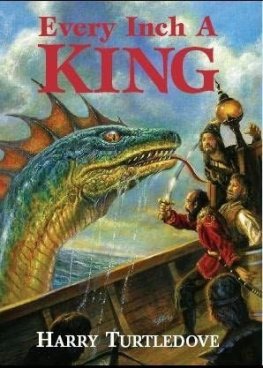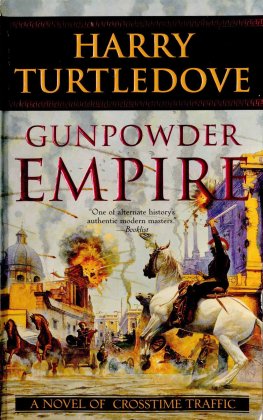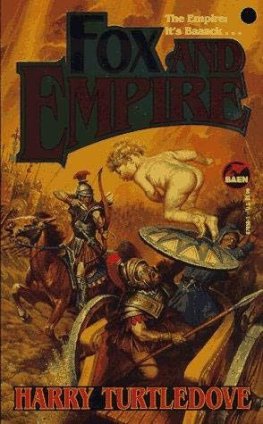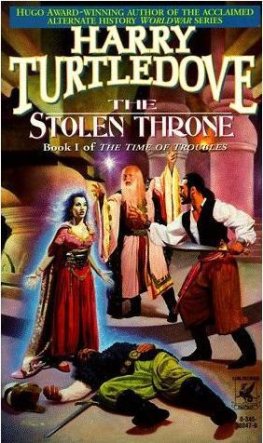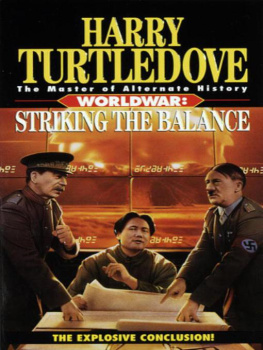Harry Turtledove
The Thousand Cities
(The Time of Troubles 3)
Abivard son of Godarz stared through sea mist to the east over the strait called the Cattle Crossing toward Videssos the city. The sun gleamed off the gilded globes the Videssians had set on spires atop the countless temples they had built to honor Phos, their false god. Abivard's left hand twisted in the gesture Makuraners used to invoke the God, the only one they reverenced.
Narseh, Gimillu, the lady Shivini, Fraortish eldest of all, let that city fall into my hands, he murmured. He'd lost track of how many times he'd beseeched the Prophets Four to intercede with the God on his behalf, on behalf of Makuran, on behalf of Sharbaraz King of Kings. As yet his prayers remained unanswered.
Beside him Roshnani, his wife, said, It seems close enough to reach out and pluck, like a ripe fig from a tree.
Scarcely the third part of a farsang from one side of that water to the other, he agreed, setting a hand on her shoulder. Were it land, a man could walk thrice so far in an hour's time. Were it land-
It is not land, Roshnani said. No point wasting time thinking what you might do if it were.
I know, he answered. They smiled at each other. Physically they were very different: she short, round-faced, inclined to plumpness; he lean and angular, with brooding eyes beneath bristling brows. But they shared a commonsense practicality unusual both in their own folk-for Makuraners were given to extravagant melodramatics-and in the devious, treacherous Videssians. After a decade and more of marriage no one knew Abivard's mind better man Roshnani, himself often included.
The sun beat down on his head. It was not nearly so fierce as the summer sun that blazed down on Vek Rud domain, where he'd grown to manhood. Still, he felt its heat: he'd lost the hair at the back of his crown. Godarz had boasted a full head to his dying day, but the men of his mother, Burzoe's, family, those who lived long enough, went bald. He would rather not have followed in their footsteps, but the choice did not seem to be his.
I wonder how the domain fares these days, he murmured. Formally, he was still its dihqan-its overlord-but he hadn't seen it for years, not since just after Sharbaraz had overthrown Smerdis, who had stolen the throne after Sharbaraz' father, Peroz King of Kings-along with Abivard's father, Godarz, along with a great host of other nobles, very nearly along with Abivard himself-had fallen in an attack gone disastrously awry against the Khamorth nomads who roamed the Pardrayan plain north of Makuran.
His younger brother, Frada, ran Vek Rud domain these days. Sharbaraz had flung Abivard against the Empire of Videssos when the Videssians had overthrown Likinios, the Avtokrator who'd helped restore the King of Kings to his throne in Mashiz. Videssian civil strife made triumphs come easy. And so, these days, all of Videssos' westlands lay under the control of Makuran through the armies Abivard commanded. And so-
Abivard kicked angrily at the beach on which he walked. Sand spurted under the sole of his sandal. Back in Mashiz that last third of a farsang looks easy to cross to Sharbaraz. What a tiny distance, he's written to me. May his days be long and his realm increase, but-
And who has done more than you to increase his realm? Roshnani demanded, then answered her own question: No one, of course. And so he has no cause to complain of you.
If I do not give the King of Kings what he requires, he has cause to complain of me, Abivard answered. His Majesty does not understand the sea. Through Makuran's long history, few men had ever had occasion to understand the sea. A handful of fishing boats sailed on the landlocked Mylasa Sea, but, before Videssos' recent collapse, the writ of the King of Kings had not run to any land that touched the broad, interconnected waters of the ocean. Sharbaraz thought of a third of a farsang and saw only a trivial obstacle. Abivard thought of this particular third of a farsang and saw-
Oars rhythmically rising and falling, a Videssian war dromon centipede-walked down the middle of the Cattle Crossing. The choppy little waves splashed from the greened bronze beak of its ram; Abivard could see the dart thrower mounted on its deck and the metal siphons that spit liquid fire half a bowshot. Videssos' banner, a gold sunburst on blue, snapped in the breeze from a flagstaff at the stern.
He did not know how many such dromons Videssos possessed. Dozens, certainly. Hundreds, probably. He did know how many he possessed. None. Without them his army could not leap over that last third of a farsang. If he tried getting a force across in the few fishing boats and merchantmen he did command-most of those had fled away from the westlands whither he could not pursue them-there would be a great burning and slaughter, and the green-blue waters of the Cattle Crossing would redden with blood for a while.
And so, as he had for almost two years, he stared longingly Tough sea mist over the water toward Videssos the city. He had studied the single seawall and the great double land wall not only with his eyes but also through detailed questioning of scores of Videssians. Could he but put his siege engines alongside those walls, he thought he could breach them. No foreign foe had ever sacked Videssos the city. Great would be the loot from that plundering.
Let me but put them alongside, he muttered.
May the God grant that you do, Roshnani said. May she grant you the wisdom to see how it can be accomplished.
Yes, may he, Abivard said. They both smiled. The God, being of unlimited mutability, was feminine to women and masculine to men.
But then Abivard turned his gaze back toward the capital of the Empire of Videssos. Roshnani's head swung that way, too. I know what you're looking for, she said.
I expected you would, Abivard answered. Old Tanshar gave me three prophecies. The first two came true years ago, but I have yet to find a silver shield shining across a narrow sea. He laughed. When Tanshar spoke those words, I'd never seen any sea, let alone a narrow one. But with so much that glitters in Videssos the city, I've never yet seen light sparking from a silver shield. Now I begin to wonder if the Cattle Crossing was the sea he meant.
I can't think of any other that would be, Roshnani said, but then, I don't know everything there is to know about seas, either. Pity we can't ask Tanshar what he meant.
He didn't even know what he'd said in the prophetic fit, so strongly did it take him, Abivard said. I had to tell him, once his proper, everyday senses came back. He sighed. But even had he known, we couldn't call him back from his pyre. He kicked at the sand again, this time with a frustration different from that of a man thwarted of his prey. I wish I could recognize the answers that spring from foretelling more readily than by spotting them as they've just passed. I shall have to speak to my present wizard about that.
Which one? Roshnani asked. This new Bozorg or the Videssian mage?
Abivard sighed again. You have a way of finding the important questions. We've spent so long in Videssos since Likinios' fall, we've come to ape a lot of imperial ways. He chuckled. I'm even getting a taste for mullet, and I ate no sea fish before these campaigns began.
Nor I, Roshnani said. But it's more than things like fish-
As if to prove her point, Venizelos, the Videssian steward who had served them since they had drawn near the imperial capital, hurried up the beach toward them. The fussy little man had formerly administered an estate belonging to the Videssian logothete of the treasury. He'd changed masters as readily as the estate had.
If the Videssians ever reclaimed this land, Abivard had few doubts that Venizelos would as readily change back.

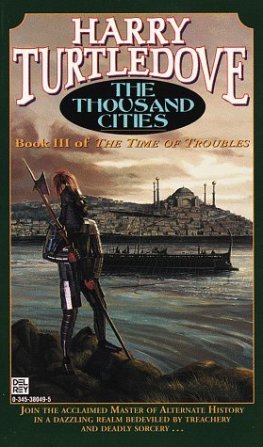
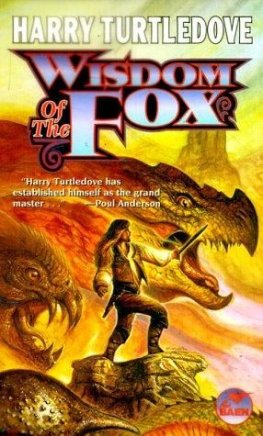
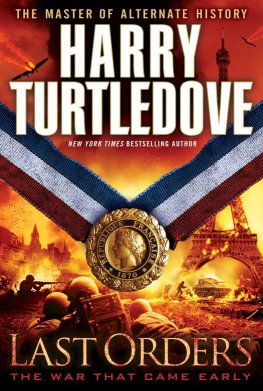
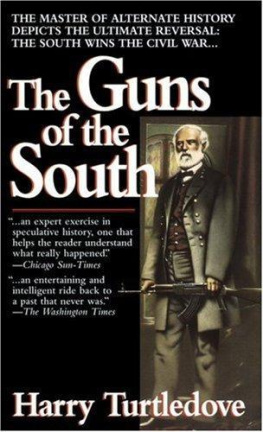
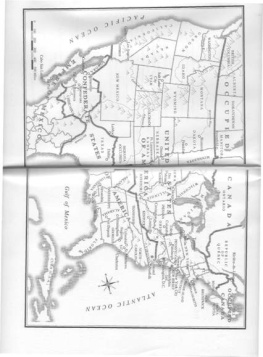
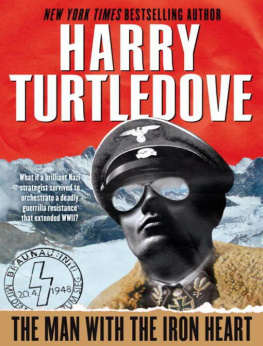
![Harry Turtledove - Worlds that werent : [novellas of alternate history]](/uploads/posts/book/79050/thumbs/harry-turtledove-worlds-that-weren-t-novellas.jpg)
